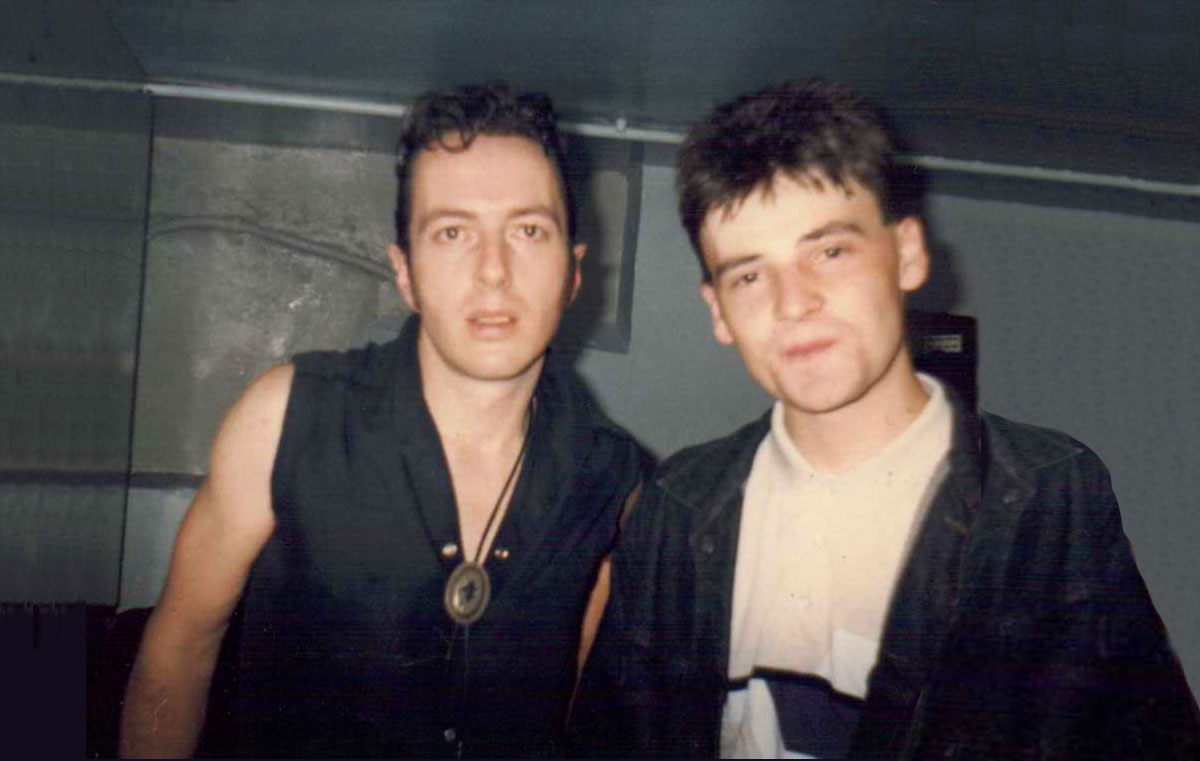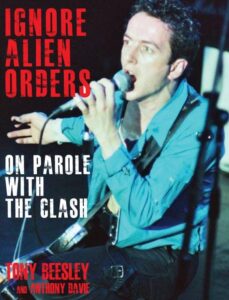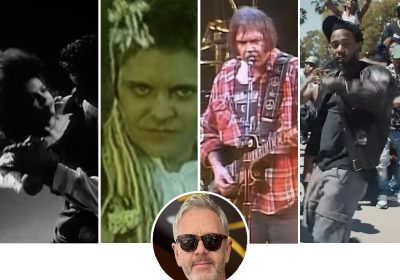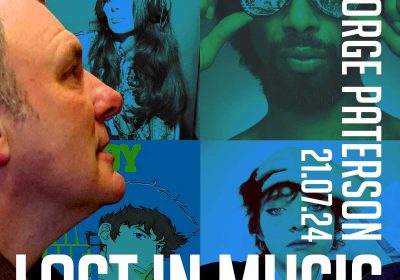Into Creative: Interview with Tony Beesley

Tony Beesley is an established author who has written and published a number of books via his own independent book company Days Like Tomorrow, which he has run with his wife, Vanessa since 2009. Into Creative recently reviewed Ignore Alien Orders – On Parole With The Clash which Tony co-authored (see review here). An avid music fan, with an eye for style, citing mod and punk as influences, Tony is extremely passionate about what he does and was kind enough to take time out from his busy schedule to talk about the book, and more, in this exclusive interview with John Welsh for Into Creative.
The history of The Clash is well documented but you have come up with a completely different approach here, giving fans the platform to share their stories, photos and experiences. Can you tell us how the idea came to write the book from this angle?
I had always wanted to write a book about The Clash, but, to begin with, I wasn’t sure on how to approach it. I had read all the must-read Clash related books and thoroughly enjoyed them all so I didn’t want to repeat what had already been put into print; an academic history of the Clash was never a route I aimed to go down. The idea of a fan’s perspective came into my head a few years back and it was just a matter of time before I set upon the task.
This format had not been done in-depth before at all and I felt that it would give a fresh perspective to the band and their legacy. Also, as much as I loved the band with a passion, I didn’t want it to be a mere fan club idolising document: if fans wanted to express a dislike for a particular album, look, political view or a bad gig… well I wanted it in there; I encouraged contributors to be forthright in this way and, although the premise of the book is our strong and lifelong love of The Clash throughout, there are some sections in which some fans discuss their disappointments.
You’ve co-authored the book with Anthony Davie who has previously written about Joe Strummer and The Mescaleros. How did that collaboration come about and did you each have designated parts of the book to work on?
It was uncanny really. I had already started this project as I received a series of emails from Ant – who was also collating fan’s accounts for the BBC (and, consequently an eBook based around the best of them). I sent Ant a piece from my perspective which he enjoyed… and soon afterwards I put it to Ant the idea of us merging our respective projects together in some way. It all happened so fast. We met up and got on very well straight away and sealed the deal over a day of Clash talk and bouncing ideas around. I worked on the actual book transcript, did all the design (cover aside) and Ant would collate his work which he then sent my way to insert. It was a rapid development that essentially, truly came into being between February to around September 2019.

There are contributions from all over the world including the USA and Sweden as well as the UK. How did you seek out input from fans worldwide? (It seems a huge task).
Most of the non-UK input came from Ant’s side … he got permission for the use of whole sections of his interviews to insert in our book; I then added them within the correct chronological section and fed back to him for his feedback. Ant has an excellent talent for reaching out to fans worldwide, in no small part due to his work with Joe & the Mescaleros, but, also, his easy-going empathetic attitude towards fellow Clash fans.
As the contributions came in, it must have been a thrill reading through what you were receiving. What were your personal highlights?
I enjoyed and loved them all, the passion and honest approach from all was refreshing to read. There was some amazing insight from the likes of Jonh Ingham and Kris Needs, who were both there right at the beginning, for example. One of the most rewarding sections to work on was with Brian Young of Rudi, a band I have always loved. Brian has long been very supportive of my work and it has to be said, he tells it exactly as it is. His personal take on some aspects of The Clash that he disliked were a perfect balance to add in the book. You knew you were hearing an all-guns-blazing perspective that was honest and passionate and not afraid to – in his eyes – dispel some of the so-called myths surrounding The Clash.
One thing that is a constant in the book is the love of the band the fans have and in many ways how that love has influenced and stayed with people throughout their life. From your own perspective, can you explain what The Clash mean to you?
Yes, this love of The Clash by us fans – and it’s a warts ’n all, all-encompassing love – is something that shines through… it leaps up from the pages, almost. Yet, we all have our own takes on it; no two perspectives are exact, if it had been a series of identical experiences, it would have never worked and become repetitive… perhaps boring, even?
For me, I reckon that my love of The Clash is best exemplified by the passage I included in the book:
“The Clash, for me, are more than just a band; they are an ideal, a positive life-force that continues to inspire, influence, educate and excite in a multitude of ways. I cannot imagine the last 40 plus years without them in my life”.
The Clash always seemed to have time for the fans, whether getting as many in for free as they could at a gig, spending time chatting or inviting fans back to their hotel for a drink – do you think this bond was an important facet of the lure of The Clash?
Definitely! There was always a sense of the members of the Clash – despite being on the front pages of the music weeklies, recording hit albums and touring the world – were very approachable and treat their fans as part of their gang. I genuinely believe that The Clash truly loved their fans; they had empathy and a genuine interest in who their fans were, not how many records of theirs they had bought. I think that the fact that they actually made such a profound impact on their fans lives was something they were proud of and so they should be. Yes, they had flaws and made mistakes, they were/are human like the rest of us, but they changed lives, clichéd as it may now sound, they really did. Importantly, I don’t think they had the answers, or professed to have them, but, crucially, they had the gift of being able to encourage their fans to think for themselves; question everything – make a difference.
The Clash didn’t stand still in terms of their musical development and dipped into a number of different genres – i.e. rockabilly, jazz, reggae and early hip hop – always pushing boundaries. They also had some diverse opening acts including Joe Ely and Bo Diddley. From your perspective, did this open you up to other bands/artists and musical styles?
Absolutely! I was already fond of reggae (thanks to Bob Marley’s chart hits and buying Althea and Donna’s Uptown Ranking back in late 77 and hearing Steel Pulse… and, certainly, some soul music. The latter was huge around my area due to the massive Northern Soul fan base so it was always close at hand. But after hearing London Calling, I became even more diverse in my tastes and began to enjoy some ska, rocksteady and more reggae etc… But, I was essentially only a kid still, and my resources were limited and we have to remember this was back in the day when there was very little existence of a back catalogue available out there, no record fairs as such etc. So, it was a case of improvising. I can remember borrowing a load of reggae LPs from our local library: albums such as the Front Line Virgin comp (which I soon bought on vinyl), Peter Tosh, early Wailers, Mighty Diamonds, Burning Spear and the obligatory Junior Murvin. I then compiled a load of reggae compilations from them before returning them.
By Sandinista, a whole new offering of different musical styles had been added to the mix and all gloves were off. I was very keen to hear even more different genres and spin-off styles thanks to The Clash. That is part of what some of their critics don’t get; each Clash album was different to the last, they really did break the mould with each new album. I think Sandinista was way ahead of its time and I understand how some fans found it hard to digest, but, for me, I quickly came to love and embrace it. Yes, it was challenging, incohesive and flawed in places, yet it is a real musical tour-de-force, one that has taken decades for music fans to truly come to terms with and fully enjoy.
The book comes in at just over 300 pages in hardback and the level of detail throughout and the end quality is clearly significant. Can you explain why that was important with regard to the end product?
It would have been pointless to have published one continuous essay of fan’s experiences. Yes, these are the real core and defining soul of the book, the whole meaning behind it, but I decided I had to complement all of the fantastic accounts with a detailed narrative wherever required, usually in the form of a chapter introduction or preceding a change of subject and focus. I believe that the added detail ideally finishes it off, creating a natural flow that gives the reader a sense of continuity. The whittling down as to what to include and omit was the aspect that wasn’t easy. I felt that it was important to include a condensed historical timeline of The Clash throughout whilst not over-empathising obvious Clash facts, but to, also, add some lesser-known Clash trivia along the way.
What do you see as The Clash legacy?
It has to be their global appeal. Whilst many bands of the same era may have a strong and devoted following, few have a truly international fan base. In each corner of the world, the music of The Clash reaches out into the lives of people and the love of their music continues to grow by the year, and that says a lot for a band that – for their classic line-up, at least – lasted less than a mere seven years (76 – 83).
You’ve also written a number of other books through your own small independent publisher ‘Days Like Tomorrow’. Can you tell us a bit about the ethos behind it and what is next for you and Days Like Tomorrow?
It all goes right back to punk’s ‘get up and have a go’ idealism, for me – and, each time, make sure you are learning from it all and are improving, otherwise what’s the point? The challenges of creative expression and visual dynamics are a huge part of what inspires me to write and work on our books; I see a blank page and think, ‘how can I create something that stands out; that hopefully grabs the prospective reader’s attention?’ It’s never easy, and there are no set rules. Thankfully, we operate completely with a no corporate company involvement. Everything is in-house. I would like to think that – in our own way – we are continuing the original spirit of punk and pushing it ahead within the world of publishing.

Our next titles include the follow-up volume to Boys Dreaming Soul by Neil Sheasby of Stone Foundation, hopefully next year. We also have a superb soul-related book in progress and are also in negotiation with a photographer with the idea of publishing a book of his punk and post-punk photos. I have seen a lot of his work and they are truly outstanding photos that fully deserve to be available in print.
We have to mention Covid-19 which is horrendous for many families and friends. This is obviously having a knock on effect on many industries including music. No gigs and a reduced amount of music releases. Do you think the music industry can recover and in particular small venues, labels, artists etc.? What part can government and general public play in this issue?
It’s been a very hard time for us all. We have been through, and still are going through, a hugely challenging unprecedented period of time. We have all suffered and none more so than those who have so sadly lost family members and friends. I still often find it surreal.
The impact upon rock & roll has been immense right across the board. I have musician friends; fellow writers etc. and we have all been affected in some way. None of us can foresee how long the impact will last or how it’s going to pan out, but I do think we will all adapt. We always do, eventually. Something good will come out of it, despite all the negativity and hardship. Music fans can help in many ways… we can all try our best to help and support others in any ways we possibly can; be that supporting on social media, recommending albums, books, buying items for gifts – getting the word out there, it all helps.
It’s fair to say that the world is presently off kilter in many ways; there is a lot of turmoil, anxiety, political unrest and change is in the air. It may have to get worse before it gets better, but we can pull through it all and be all the better for it; after all, as Joe Strummer stated Without People, You’re Nothing!
Finally, thinking back to all the gigs you’ve attended, which one stands out the most as really memorable and why?
It has to be The Clash on the 16 Tons tour, promoting their just released London Calling double album. I saw The Clash at Sheffield Top Rank; I entered the venue as a naïve, frustrated punk-obsessed kid with a lot of hang-ups and came out completely in awe and a feeling of rejuvenation; it was almost my year zero moment in a way.
The album and this gig completely changed my perspective; inspiring a new attitude towards music and how I felt about the world. I became far more open-minded about other music genres, something that has taken me on a path to this day. The gig is forever etched into my mind and was such a height of youthful euphoria, excitement and adrenalin, I have to often pinch myself to believe it actually happened and I often think back to that gig. It does help to keep the memory alive with the fact that there are some amazing photos from the gig in the book.
It is kind of like a reference point for the whole of my life. I suppose, to some, it may sound extravagant, but I’m sure all Clash fans have a similar experience to look back on… and that’s why books by the fans on bands such as The Clash are hugely important.
For more information on Tony and Days Like Tomorrow, visit the website here and to purchase Ignore Alien Orders and other titles, click here.
John Welsh
@welshjb




Leave a Reply
You must be logged in to post a comment.